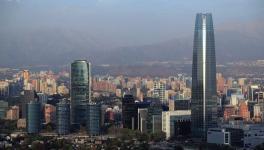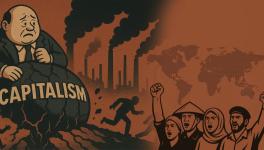C P Chandrasekhar Speaks on ‘Capital and the Critique of Bourgeois Political Economy’
The Safdar Hashmi Memorial Trust (SAHMAT) is organising a series of four lectures by eminent economsit Prof. C.P. Chandrasekhar to commemorate 150 years of the publication of Volume I of Karl Marx's seminal work, Capital.
The first lecture, titled 'Capital and the critique of bourgeois political economy', was delivered on 9 September 2017 at the India Habitat Centre in New Delhi.
Below we publish a summary of the lecture.
If we look at Marx’s and Engel’s writings between 1848 (when the Communist Manifesto was published) and 1867 (when Capital, Volume I was published), there was the perception that, if not in the last quarter of the 19th century, at least in the first half of the 20th century or later, we would see the transcendence of capitalism. Implicit in this perception was that the progressive character of capitalism would be its own undoing, with technological changes turning the social relations that unleash them into their own fetters.
Once the process of primitive accumulation had created the conditions for the extraction of surplus value, in a system with equivalent exchange, i.e., where commodities were being exchanged at their full value, accumulation in the quintessentially capitalist form begins and crudely coercive primitive accumulation moves into the shadows.
Once the forces of capitalist accumulation unleashes the productive forces, productivity increases, and means of subsistence cheapen, leading to surplus being extracted in the form of relative surplus value rather than absolute surplus value, i.e., rather than largely through an extension of the working day or through an increase in the intensity of labour, it comes because of changes in the means of production which results in the cheapening in part of the elements of subsistence which enter into the workers’ consumption basket.
This is at times interpreted as an almost linear shift from primitive to normal modes of accumulation and from absolute to relative surplus value extraction. That linearity is also read by many into this idea that there is, to a certain extent, an inevitability that at a certain stage of development, the material productive forces of society would come into conflict with the existing relations of production which begins an era of social revolution.
This was indeed the process which, in Marx’s view, gave rise to capitalism, rendered it transient and prepared the ground for the abolition of private property.
Marx built into his analysis three tendencies that made capitalism, like previous modes of production, almost inevitably transient.
The first is the logic of accumulation under capitalism that results in the rapid development of the productive forces and brings them into conflict with the social relations of production.
The second tendency was the conflict between capital and labour that cannot be resolved under capitalism, and which provides the ground for the overthrow of the system.
The third is the inevitability of crises under capitalism that provides the trigger for the intensification of class conflict, and unleashes revolutionary movements.
Marx framed his discussion in Capital as a critique of political economy, especially the works of the classical economists, from the Physiocrats, through Smith and Ricardo, and in constant opposition to the vulgar economists of that period whom he saw as conscious or unconscious apologists of the bourgeoisie.
The analysis of the classical economists proved inadequate to Marx, the reason being that political economy within the bourgeois horizon looked at capitalism not as a historical phase in the evolution of social production, but as something which was near-eternal.
Marx’s extended engagement with political economy was part of an effort to combine the application of Hegelian dialectic, now of course turned on its head, and the revolutionary ideas derived from the French Revolution and the early socialists, with an understanding and critique of English political economy.
The insights from English political economy, combined with a critique could take the science in a direction where it became a weapon for the working class. The working class needed this weapon because that class is the instrument, in Marx’s view, through which history would ensure the transcendence of capitalism, a process that bourgeois political economy which saw capitalism as the end of history could not contemplate.
A combination of political economy with the larger perspective provided by the use of Hegel’s dialectic led up to what we see in the three volumes of Capital.
While classical political economy was his point of departure, Marx’s discussion in Capital marked a substantial leap forward in a number of ways. In terms of method, he starts with the elementary form in which wealth appears under capitalism – commodities – to first identity the substance of value which is abstract labour time. That in turn gives the magnitudes that define the proportions in which commodities exchange in the market, or their exchange values.
The recognition of the distinction between the labourer and his own labour power, and between the value of labour power which is socially and historically determined, and the value that the labourer contributes in the form of living labour during the working day was the most significant contribution that Marx made to the advance of political economy.
The idea is that surplus value emanates from the fact that the worker is paid a wage which is equal to the value of reproducing labour power when the capitalist chooses to use his capacity to labour as the use value in production along with the means of production. The capitalist who bought the right to use labour power, which he has paid for at its value, acquires the right to the surplus value that is congealed in the new commodity produced when he combines labour power with the material forms of capital he owns in the process of production. The surplus value acquired allows for the continuous self-expansion, or valourisation, of capital even when all exchanges occur at the full values of the commodities involved. This was the fundamental conceptual advance made in Marx’s enunciation of the Labour Theory of Value.
The production of use value is incidental, though necessary, for the capitalist, who as capital personified is focused on the extraction of surplus value for accumulation.
Since the magnitude of surplus value depends on the total length of the working day and the value of labour power, it can be increased, either by lengthening the working day, which is the extraction of absolute surplus value, or by reducing the value of labour power through productivity increases in sectors that produce the goods entering into the workers’ consumption basket, which is the extraction of relative surplus value.
In either case, since the ratio of surplus value to variable capital rises, i.e., the s/v ratio rises, so does the rate of exploitation.
But in Marx’s view, it is the extraction of relative surplus value through productivity-enhancing investments that was characteristic of capitalism in its fully developed form.
Since capitalism must confront ‘doubly free’ labour (free to dispose of her/his labour power as a commodity, and free of, or separated from, all commodities that would allow her/him to use and realise the value of this capacity to labour) in the market for capital accumulation in its full-fledged form to occur, the fact that labour power in that form must emerge through a process of primitive accumulation affects the ability of the system to extract relative surplus value in the first instance.
When money capital first seeks to realise the circuit M-C-M`, it does not have, ready at hand, enough ‘doubly free’ workers. It extracts surplus by bringing the existing world of peasants and petty producers operating with pre-existing techniques of production under its sway to what Marx identifies as the formal subsumption of labour to capital.
In those conditions, only absolute surplus value can be extracted, since the technical conditions of production are given.
It is only when workers who have nothing to sell but their labour power confront capital accumulated in the hands of a few, that the conditions where the owners of capital can transform the process of production and enhance surplus value extraction in the form of relative surplus value are created.
This is the phase of the real subsumption of labour by capital.
Hence at many points in his analysis, Marx appears to suggest that the extraction of relative surplus value based on the real subsumption of labour by capital inevitably displaces the extraction of absolute surplus value through the formal subsumption of labour by capital.
These suggestions that primitive accumulation is only a first step in capitalist evolution, that absolute surplus value extraction will be displaced by relative surplus value extraction, could be interpreted as resulting from Max’s reading of the dynamism that post-Industrial Revolution capitalism displayed. It could also be seen as reflective of the view that a combination of workers’ movements and legislation in the form of the Factory Acts they led to in England would force capital to limit the working day and to accelerate technical change so that accumulation depends largely on relative surplus value.
As Marx noted in his Preface to the first German edition, his intention was to examine the capitalist mode of production and the conditions of production and exchange corresponding to that mode by analysing the capitalism of England at that time, which was its classic ground.
The fact that other countries, including Germany, were not characterised by the dynamism that England displayed did not undermine the generality of that analysis because in Marx’s view, the country that is more developed industrially only shows to the less developed the image of their own future.
In Marx’s understanding, though by the time Capital, Volume I was completed, more than a century had passed since the emergence of industrial capitalism in England and elsewhere, the capitalist mode was not present in its pure form even in Germany, where the first edition was launched. (In practice, in most contexts including Germany, alongside of modern evils of capitalism, a whole series of inherited evils oppressed the people.)
This kind of reading of the nature of actually existing capitalism was also encouraged by the fact that in Capital as it came to be published, Marx neither undertook an extensive analysis of the role of the state in supporting capital accumulation, nor an analysis of the impact that capital expansion had on the peripheral countries and colonies.
Regarding the former, of course there were discussions, but not extensive analysis of how the state supported and provided a site for the persisting primitive accumulation of capital. He had noted that the state was an important instrument and agency for the primitive accumulation of capital, but the analysis was not yet detailed enough because of the fact that the work remained incomplete. In fact in the earlier chapterisation of what Capital was going to be, the state was going to be an important agency which was going to be analysed.
Marx did not analyse the impact that capital expansion had on the peripheral countries and the colonies, where its modernising influence did not exclude coercive extraction of surplus, subordination of petty producers operating with primitive techniques, and reproduction of backward relations of production so as to maximise the extraction of absolute surplus value.
The resulting optimism about the transformative potential of capitalism and increasing assertion of the collective will of the working class possibly explains the fact that Marx, (1) considered primitive accumulation as being confined to the early stages of capitalism before the capital-wage labour relation is to a substantial extent, universalised; (2) saw a sequential movement away from the formal to the real subsumption of labour by capital and from the abstraction of absolute surplus value to the extraction of relative surplus value; and (3) argued that this transition would be hastened by the ability of the working class to both limit the length of the working day and raise the level of wages.
Any reading of world history over the last 150 years would indicate that the first two of these features have not been confined to specific phases of capitalism, but have persisted to differing degrees in different contexts across capitalist history.
If surplus value is enhanced by paying workers less than the full value of labour power, it is being expanded through the appropriation of a part of what is the worker’s due in any given social and historical context – a due in the sense of paying the equivalent of the exchange value of that labour power.
This remains true even 150 years after the publication of Capital, with the growing presence of casual, temporary, self-employed workers, and the unleashing of competition between the reserve army of cheap labour constantly reproduced in the colonies earlier and in the peripheral countries today. The competition between peripheral workers and workers in the metropolitan countries only aggravates this tendency.
Finally, any study of actually existing capitalism must treat is as a world system and not just as an English phenomenon.
Marx’s discussion of imperialism outside of Capital, in his New York Tribune articles, for example, did recognise, (1) the role of surplus transfer and market access in the colonies in sustaining the capital accumulation in England, capitalism’s classic ground and (2) the role of the subordination of the petty producer and peasantry, and capture of the state by capital in extracting the surplus that was transferred to England. Such transfers and market invasion continued to play a role throughout the 20th century and does so even today under the aegis of finance.
So the transformation that Marx took for granted, though visible and significant, has not been taken to completion even in the developed capitalist world and definitely not in the large, less developed, periphery of capitalism.
The period after World War II, when unemployment in the developed world was low and welfare state measures were in place, was an exception rather than the rule. With unemployment in developed countries soaring and remaining high after the 2008 crisis, descriptions of the labour market point to precarious conditions there as well, apart from the developing world characterised by the large size of the informal sector.
The dominant conclusion from the 150 years that have passed is the persistence, in changed forms, of the extremely intensive exploitation of workers and producers, especially in the periphery through primitive forms of subsumption and the persistent reliance on absolute surplus value extraction, and the realisation of all of these at the expense of weakened labour with help from the state.
Moreover, ever since the onset of the monopoly phase of capitalism in the quarter of a century after the publication of Capital Volume I, the role of the state as a means and site for primitive accumulation has hugely increased.
Among the reasons for the resilience of capitalism, thus, is its ability to find new ways to extract surpluses using old means.
Get the latest reports & analysis with people's perspective on Protests, movements & deep analytical videos, discussions of the current affairs in your Telegram app. Subscribe to NewsClick's Telegram channel & get Real-Time updates on stories, as they get published on our website.
























